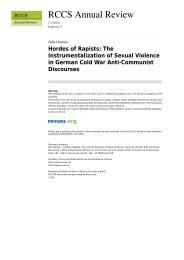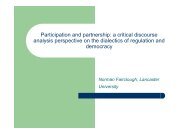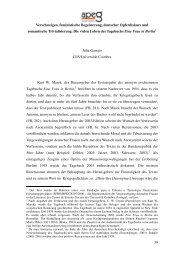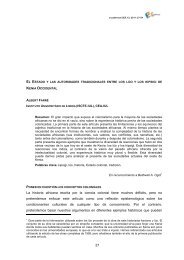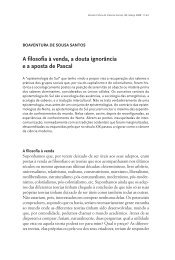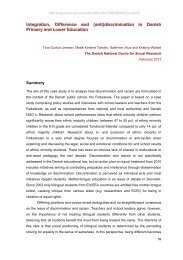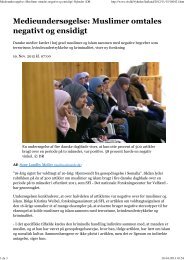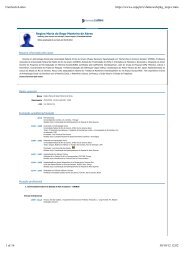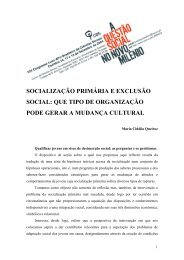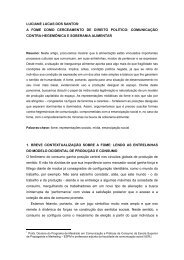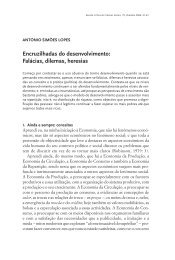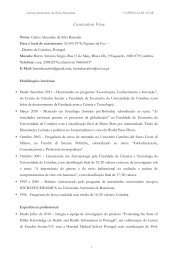Analysis of Integration Policies and Public State-Endorsed ...
Analysis of Integration Policies and Public State-Endorsed ...
Analysis of Integration Policies and Public State-Endorsed ...
Create successful ePaper yourself
Turn your PDF publications into a flip-book with our unique Google optimized e-Paper software.
Working paper produced within the TOLERACE project<br />
The cartoon affair did not develop out <strong>of</strong> nowhere. More specifically, one can<br />
see them as an example <strong>of</strong> the recurring theme <strong>of</strong> immigrant values (<strong>and</strong> just as<br />
frequently Islam) as challenging freedom <strong>of</strong> speech, a value <strong>of</strong>ten argued as inherently<br />
Danish, as, for example, illustrated by then-prime minister <strong>of</strong> Denmark, Anders Fogh<br />
Rasmussen‘s (from the Danish Liberal Party) New Year address in early 2004:<br />
Immigrants have to make an effort themselves. They must underst<strong>and</strong> the values that the<br />
Danish society is built upon. For generations we have taken these values for granted –<br />
among others because we have developed them over generations. But these values are<br />
contested within recent year …. [In Denmark ] we have freedom <strong>of</strong> speech. Even the<br />
freedom to speak nonsens. And there is freedom to difference…But the Danish society is<br />
built on some fundamental values that one must accept to live here…. For many years we<br />
have been stupidly generous [tossegode]. We have not dared to say that some [values] are<br />
better than others. But we have to say so now. 44<br />
One interesting aspect <strong>of</strong> both Flemming Rose‘s <strong>and</strong> Anders Fogh Rasmussen‘s<br />
statements are that they, first, describe freedom <strong>of</strong> speech as an educative project<br />
(people living in Denmark, not least newcomers, must learn that this is a core<br />
Danish value) <strong>and</strong>, second, that they describe this core value as being under<br />
threat by the very people that they seek to educate. As noted by Tariq Modood in<br />
his analysis <strong>of</strong> the Cartoon Crisis, there is a tension between the (proposed) right<br />
to ridicule <strong>and</strong> the furthering <strong>of</strong> integration <strong>of</strong> Muslims in Denmark (Modood, 2006:<br />
6).<br />
A final, noteworthy aspect <strong>of</strong> the discourse is that while Fogh Rasmussen‘s<br />
<strong>and</strong> Rose‘s statements include a critique <strong>of</strong> outsiders, so is there a parallel strain<br />
<strong>of</strong> internal critique, exemplified by Fogh Rasmussen‘s <strong>and</strong> Kjærsgaard‘s blaming a<br />
`we´ (i.e. Danes) for being – in the words <strong>of</strong> Fogh Rasmussen `stupidly generous´<br />
<strong>and</strong> in the words <strong>of</strong> Kjærdsgaard `reluctant´ <strong>of</strong> realizing such threats – whether<br />
directed against the Danish welfare state or, <strong>of</strong>ten simultaneously, against<br />
freedom <strong>of</strong> speech <strong>and</strong> `Danish values´.<br />
The cartoon crisis <strong>of</strong> 2005-2006 marked a zenith <strong>of</strong> these debates.<br />
However, the crisis did not silence them. In 2010 (the year in which this brief<br />
description was written) the freedom <strong>of</strong> speech card was pulled on several<br />
occasions in the immigration/integration debate. One occasion was, as described,<br />
the DPP‘s media borne campaign for an integration commission. Another was the<br />
DPP‘s campaign <strong>of</strong> removing § 266b in the Danish criminal code, a suggestion<br />
that was supported by some members <strong>of</strong> parties in government (the<br />
Conservatives <strong>and</strong> the Danish Liberal Party). One argument for removing the<br />
44 http://www.statsministeriet.dk/Index/dokumenter.asp?o=2&n=0&t=14&d=1327&s=1<br />
73



